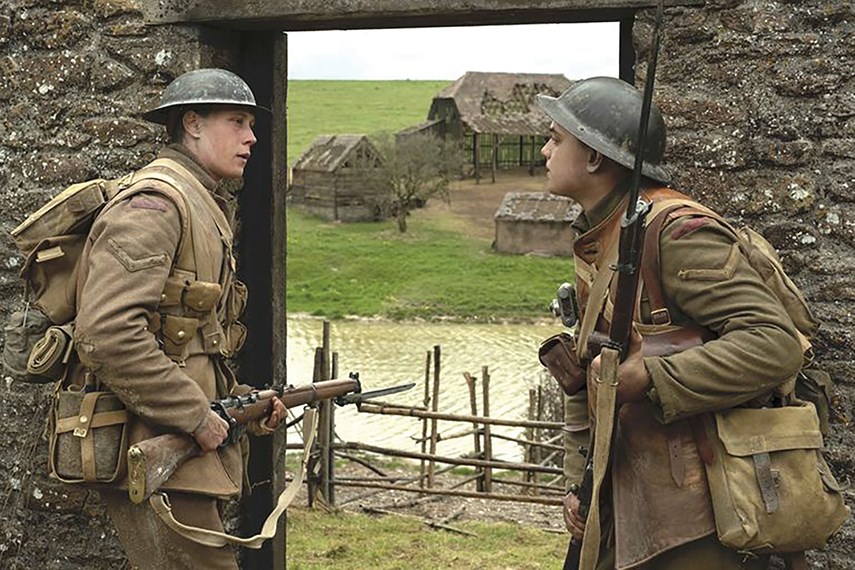1917. Directed by Sam Mendes. Starring George MacKay and Dean-Charles Chapman. Rating: 10 (out of 10)
The War to End All Wars, The Great War, The First Modern War. The First World War was grand in scope, with some 37 million left dead across France, Belgium, Egypt and the Sudan, East Africa, Persia and Kurdistan, India and North China.
Many films tackle campaigns or the exploits of platoons. It’s more personal and more manageable to focus on a Band of Brothers, for example, than the war as a whole. Director Sam Mendes goes one better in 1917, distilling everything down to a single order given to two men who have a slim few hours in which to execute it.
Lance Corporals William Schofield (George MacKay) and Tom Blake (Dean-Charles Chapman) are the two men called up for the job. Gen. Erinmore (Colin Firth) tells them somberly that two battalions of men, some 1,600, are ready to launch an offensive against the retreating Germans. What the battalions don’t know is that the retreat is a bluff, and the Brits are advancing headlong into a trap.
It’s up to Schofield and Blake to climb out of the trenches, to race through no-man’s land, through enemy territory, and across the French countryside to find the platoon before it’s too late. An added incentive: Blake’s brother is among the doomed men.
Daylight shows the hellscape in which the men manoeuvre in harsh relief: horses lay bloated and rotting on the ground; corpses pose oddly, held in place by barbed wire; rats the size of pampered house cats feast on the dead.
Before we get this far, we realize something amazing: all the jostling in the trenches, the orders, the dangerous up-and-over out into the line of enemy fire, and all that comes next seems to have been executed in one, continuous shot. To save you looking at your watch every few minutes (as I did) in wonderment at how long the shot will last, let me save you the trouble: Mendes and DOP Roger Deakins (Blade Runner 2049, Skyfall) use their combined talent and new technology to make the entire film look as though it was shot in a single take.
The long/single concept isn’t gimmicky here but rather a highly effective technique that shows just how much life can change in two hours. Other films have done it (Birdman comes to mind, as well as the exquisitely long Dunkirk beach scene in Atonement) but none has provided the degree of intimacy and immediacy that 1917 does: we feel like the third man on the mission, clawing through mud and avoiding sniper fire in real time.
The camera is always moving and the scenery changing: there’s immense beauty in this film, in the pits as well as in the gardens and the wide-open spaces. Things become more intense the closer we get to the enemy, as darkness falls and blazing fires and mortar shells light up a town caught in the middle.
The dialogue becomes negligible the more peril the men encounter, but it suits the suspense that filmmakers have created and we don’t miss the chatter. Likewise the lack of backstory attributed to our characters: we get enough information to know which man is seasoned, who’s an optimist, and who is most likely to make a fatal mistake. Schofield and Blake are the “everymen” of the First World War, young men put squarely in harm’s way at the whim and pleasure of higher-ups. “Chin up, there’s a medal in it for sure,” says a battle-hardened Lt. Leslie (Andrew Scott) sarcastically. ”Nothing like a scrap of ribbon to cheer up a widow.”
Mark Strong, Benedict Cumberbatch and Richard Madden make appearances, but no one jostles for the spotlight. MacKay does an excellent job of being our main focus for the full two hours, during which the tension never relents.
There’s little hope and no glory in 1917, only a sense of the terrible waste of human life. Mendes doesn’t hit us over the head with politicking but rather lets us form our own opinion as we journey along with the men. “I hoped today might be a good day,” says one soldier. “Hope is a dangerous thing.”


